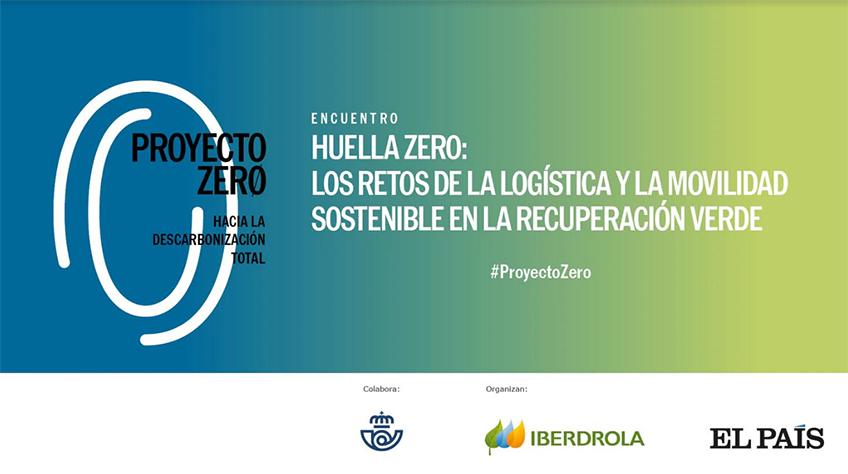News
EL PAÍS hosts debate on the green recovery and the challenge of sustaintable logistics, transports and mobility
11-09-2020

Project Zero explores the role of transport and logistics in economic reconstruction
The world will not win the battle against climate change if it does not move towards sustainable mobility. Transportation has emerged as a major hurdle in the race to reduce greenhouse gases. While other sectors, such as energy production and industry, have steadily reduced their emissions since 1990, transport emissions have increased. The current public health crisis, however, offers us an opportunity to accelerate the transport sector’s transformation towards a cleaner model thanks, in part, to Europe’s commitment to a green recovery. This was just one of the conclusions reached by various experts who came together for the third session of the Project Zero forum, organized by EL PAÍS and Iberdrola, and with the collaboration of Correos.
"Covid-19 is an opportunity to reshape the sector," said Jari Kauppila, Head of Quantitative Policy Analysis and Foresight Division at the International Transport Forum at the OECD. Today, increasing numbers of families, public administrations and companies are opting for the purchase of an electric vehicle, said Diego Díaz, head of the Iberdrola-PERSEO international start-up program. “This month we are set to reach the figure of nine million electric vehicles worldwide. Five years ago there were approximately 900,000. This is exponential growth,” he added.
The public health crisis is a turning point and has increased people's awareness of certain problems, such as air quality in our cities. Proof of this is the number of electric vehicles registered in recent months. "In August they have almost tripled compared to the previous year," said Arturo Pérez, managing director of the Business Association for the Development and Promotion of Electric Vehicles (AEDIVE).
But the issue involves so much more than the use of electric cars, attendees also heard. "Obviously they have a major role to play, but not all mobility issues in cities are going to be solved by changing cars," said Carlos Bergera, Iberdrola's head of external relations for Smart Mobility. The expert explained that cities also have to adopt new digitization systems. "A smarter city will foster mobility", he explained. In the quest for a better planet, one of the key players is logistics, one of the sectors to have seen most growth during the quarantine period, due to the boom in online shopping. "Nobody could have foreseen a situation like the one we have just experienced," said Elena Fernández, deputy director of international relations, CSR and sustainability at Correos. "[The pandemic] forced us change our entire logistics network overnight," said Fernández.
That transformation is here to stay, just like online shopping. This means more traffic and, therefore, more pollution. "In cities there are many agents: goods are distributed, there is public transport, there is waste collection, there are emergencies -- there’s lots going on," said Ramón García, Innovation and Projects Manager of CEL. Today, logistics is a key player in our cities and, as such, should be considered as a key component when it comes to urban planning and the design of streets to better scale them for loading and unloading, García added.
But the most important thing we can do in favor of the environment is to reflect on what we buy online, Fernández stressed. "We should think before buying and we should avoid , whenever possible, returning our purchases, even though this may be our right. For example, in the United States, the transport of returns generates 15 million metric tons of carbon dioxide per year, according to a study conducted by technology firm Optoro, said May López, director of Business Development for Sustainable Mobility and lecturer at EAE Business School. "We must rethink our consumption habits" she said during her talk.
Project Zero is a forum for sharing success stories in the fight against climate change and for discussing the impact of how we respond to environmental challenges on a wide range of different economic and social sectors that are seen as key to reconstruction in the wake of the economic crisis caused by COVID-19. Through a total of five events, Project Zero seeks to inspire and pay tribute to projects that promote sustainability as a model for growth and economic recovery.
It may interest you



